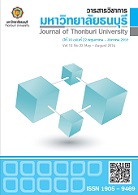ผลกระทบของภาวะเศรษฐกิจต่อพฤติกรรมการดำรงเงินกองทุนต่อสินทรัพย์เสี่ยงของธนาคารพาณิชย์ไทย
Keywords:
การดำรงเงินกองทุน, สินทรัพย์เสี่ยง, ธนาคารพาณิชย์, Capital Fund Requirement, Risk Asset, Commercial Bank,Abstract
การวิจัยครั้งนี้มีวัตถุประสงค์เพื่อ (1) ศึกษาหลักเกณฑ์ Basel (2) ศึกษาพฤติกรรมการปล่อยสินเชื่อสินทรัพย์เสี่ยงธนาคารพาณิชย์ไทย โดย (1) รวบรวมข้อมูล Basel (2) วิเคราะห์ผลกระทบของภาวะเศรษฐกิจต่อพฤติกรรมการดำรงเงินกองทุนต่อสินทรัพย์เสี่ยง โดยโปรแกรม SPSS สถิติ Regression ข้อมูลมกราคม 2540 - ธันวาคม 2556 จากธนาคารพาณิชย์ 14 แห่ง โดยกำหนดตัวแปรอิสระ คือ ผลิตภัณฑ์มวลรวมในประเทศ (GDP) ปริมาณเงิน (M2) อัตราดอกเบี้ยเงินกู้ยืมแบบมีระยะเวลาสำหรับลูกค้าชั้นดี (MLR) และการลงทุนภาคเอกชน (PI) ตัวแปรตาม คือ อัตราส่วนเงินกองทุนต่อสินทรัพย์เสี่ยง อัตราส่วนเงินฝากต่อเงินกองทุน อัตราส่วนเงินให้กู้ยืมต่อเงินกองทุน อัตราส่วนเงินกองทุนต่อสินทรัพย์ อัตราส่วนเงินกองทุนต่อหนี้สิน และอัตราส่วนกำไรสุทธิต่อเงินกองทุน ผลการวิจัยพบว่า (1) ผลิตภัณฑ์มวลรวมในประเทศเพิ่มขึ้นมีผลทำให้อัตราส่วนเงินกองทุนต่อสินทรัพย์เสี่ยงเพิ่มขึ้นซึ่งไม่เป็นไปตามสมมติฐาน การลดลงของการลงทุนภาคเอกชนทำให้อัตราส่วนเงินกองทุนต่อสินทรัพย์เสี่ยงเพิ่มขึ้นโดยเป็นไปตามสมมติฐาน (2) GDP เพิ่มขึ้นมีผลทำให้อัตราส่วนเงินฝากต่อเงินกองทุนเพิ่มขึ้น การลดลงของ MLR มีผลทำให้อัตราส่วนเงินฝากต่อเงินกองทุนเพิ่มขึ้น (3) GDP เพิ่มขึ้นมีผลทำให้อัตราส่วนอัตราส่วนเงินฝากต่อเงินกองทุนลดลง (4) GDP เพิ่มขึ้นมีผลทำให้อัตราส่วนอัตราส่วนเงินฝากต่อเงินกองทุนเพิ่มขึ้น (5) GDP เพิ่มขึ้นมีผลทำให้อัตราส่วนเงินฝากต่อเงินกองทุนเพิ่มขึ้นและเป็นไปตามสมมติฐาน สำหรับปริมาณเงินเพิ่มขึ้นมีผลทำให้อัตราส่วนเงินฝากต่อเงินกองทุนลดลงโดยไม่เป็นไปตามสมมติฐาน MLR เพิ่มขึ้นทำให้อัตราส่วนเงินฝากต่อเงินกองทุนเพิ่มขึ้นไม่เป็นไปตามสมมติฐาน
EFFECTS OF ECONOMIC SITUATION ON THE BEHAVIOR OF COMMERCIAL BANK’S CAPITAL FUND OF THAILAND
The objectives of this study were (1) To study the introduction of “Basel” and “Capital requirements”. (2) The commercial behavior on lending to risky assets in Thailand.
Research Methodology: (1) Study on the principles of Basel (2) Study the effect of macroeconomics factors on the capital adequacy ratio by using SPSS for window and Regression Method. The data were in January 1997 to December 2014, and consisted of 14 commercial banks. In this study, the researcher determined the independent variable which comprised of the gross domestic product (GDP), money supply (M2), minimum loan rate (MLR), and private investment (PI). The dependent variables were the capital to risk assets ratio, deposits to capital fund ratio, loan to capital fund ratio, capital adequacy ratio, capital to liabilities ratio, and net income to capital fund ratio. Results findings were as follows: The increasing in GDP affected to increase in the capital to risk assets and met the assumptions. The decline of PI affected to the capital to risk assets ratio and met the assumptions, and increased to the deposits to capital fund ratio. The reduction of MLR affected to increase the deposit to capital fund ratio. The increasing in GDP affected to reduce the deposits to capital fund ratio. The creasing in GDP affected to increase the deposits to capital fund ratio, and increase the deposits to capital fund ratio which based on the determined assumption. The increasing in the M2 affected to reduce the deposits to capital fund ratio and met the assumptions. The increasing in MLR affected to increase the deposits to capital fund ratio which not met assumption.







